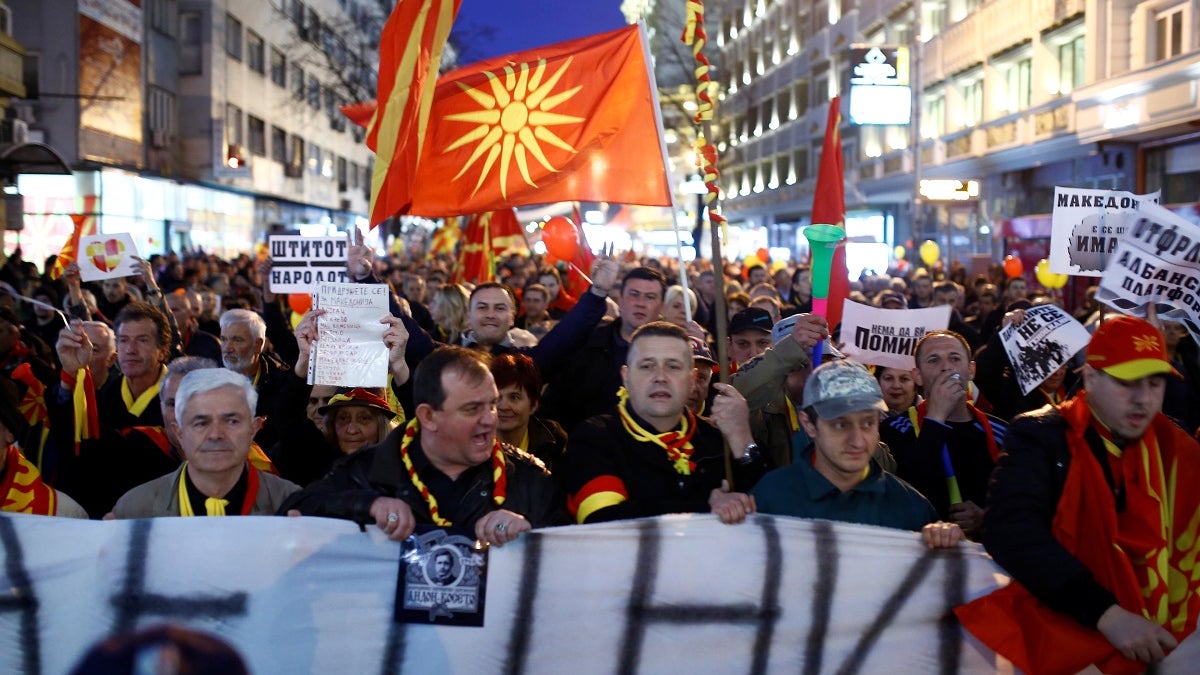
Protesters demonstrate against an agreement that would ensure the wider official use of the Albanian language, in Skopje, Macedonia March 9, 2017. (REUTERS/Ognen Teofilovski )
On behalf of the United Macedonian Diaspora (UMD), I am responding to recent political machinations emanating from Albania that are making anything but melodious sounds across its border in the Republic of Macedonia.
First, Gjovalin Shkurtaj of the Academy of Sciences of Albania recently penned a highly misleading op-ed. The article repeatedly uses patently false information as well as derisive rhetoric that, together, are meant to delegitimize Macedonia.
The article derogatorily refers to Macedonia as a “made-up republic.” As a member of the Academy of Sciences of Albania, surely the writer should know that all nation-states – including Albania -- are artificial constructs to varying degrees. Mr. Shkurtaj’s offensive comments seem aimed to further fan the flames of ethnic division.
Mr. Shkurtaj, an ethnic Albanian, also claims repeatedly that the Albanian minority in Macedonia makes up more than 25 percent of the population. However, there is no current factual evidence to support that claim. Macedonia has not had a census since 2002. Furthermore, based on official government social health system registrations, approximately 17 percent of the registrants identify themselves as of Albanian ethnicity. That’s a far cry from 25 percent.
Mr. Shkurtaj also knowingly uses previously retracted statements of U.S. Congressman Dana Rohrabacher. He does so in spite of the fact that the congressman issued a press release on February 21, 2017, in which he said, among other things that, “Upon reflection, I see that some of [my] statements did not accurately convey my intent. This release clarifies my position. Macedonia is a legitimate country with the right of self-determination and sanctity of borders.”
Second, Albanian Prime Minister Edi Rama has threatened to block Macedonia’s NATO membership – Macedonia, the very country that, along with Croatia, helped Albania when it was critically lagging in terms of its own NATO membership aspirations.
This, in spite of the fact that, in 2013, Mr. Rama acknowledged the full human rights of ethnic Albanians in Macedonia, as well as, conversely, Albania’s failure to grant such rights to its own ethnic Macedonian minority. Perhaps Mr. Rama needs to be reminded that, while political winds may change, neighbors are forever, and they do not forget.
So, why are Albanian leaders using Macedonia’s current domestic challenges as an opportunity to pile on?
I see at least a couple of possibilities.
First, it seems that their statements are meant to eventually create a greater Albania, at the expense of Macedonia and its other Balkan neighbors.
In that regard, the unprecedented and perfidious meeting in December, in Tirana (which took place just two days after Macedonia’s elections), between ethnic Albanian political party leaders of Macedonia and Albanian Prime Minister Rama, supports the view that Albania is meddling in the internal affairs of a neighbor state for its own long-term irredentist aims.
Second, perhaps Mr. Rama and his team find it convenient to distract their own country’s voters by raising specious issues from across its borders in Macedonia. Or, maybe both of these reasons explain Tirana’s provocations.
In any case, Mr. Rama and his fellow propagandists would be well advised to act responsibly and honorably, for instability knows no borders and does not discriminate. . . as they should well remember, given the not too distant past when Albania faced its own political and ethnic demons and was on the cusp of disintegration.
